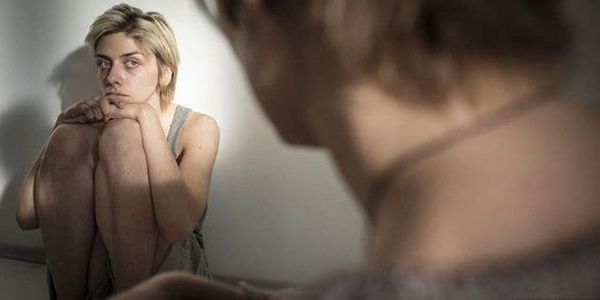Eye For Film >> Movies >> Body (2015) Film Review
Body
Reviewed by: Amber Wilkinson

Malgorzata Szumowska takes a playful approach to the subjects of eating disorders and grief with suprisingly effective results in Body, which is as much concerned with spirtual matters as it is the corporeal. The quirky viewpoint of Szumowska and her co-writer Michal Englert is emphasised from the start, when we are introduced to gallows humour in the most literal of ways. A prosecutor (Janusz Gajos) - who is never referred to by name - attends the scene of a suicide. A body swings from a tree as he goes about the business of documenting the situation. He's so preoccupied with the detail that he fails to check the body itself - which, as it turns out, is still very much alive, stumbling away once he is cut down.
This sardonic inability to engage extends to his home where, since the death of his wife some years previously, life has become suspended. His daughter (Justyna Suwala) hates him with a passion only matched by a disgust at her own body, which she has emaciated through bulimia, and her mother's office has become a dusty shrine to memory.

Acting as a catalyst for change - and a rich source of pathos and humour - comes Anna (Maja Ostaszewska), a therapist who takes a distinctly New Age and spiritual approach to the affairs of the physical, urging her group of anorexics to embrace scream therapy and similar techniques and engaging in a spot of communication with the dead in her spare time. When things start to go bump in the night round at the prosecutor's, he begins to find his dogged faith in nothing beyond the here and now severely shaken.
There are bodies everywhere in this film, from the undernourished anorexics often viewed in nothing but a vest an knickers, to a bunch of dead ones at the graveyard who have had to be disinterred due to flooding. Szumowska finds absurdity in almost every situation, especially where Anna is concerned, scarily sincere in her other worldly views - and Suwala, Ostaszewska and Gajos keep the dead pan dead on. Beneath the humour, however, there is a longing for connection. Anna herself has been touched by a tragedy that explains much of her dedication to the dead, while the hole of grief in the centre of Olga and her father's lives has sucked their relationship into it. Szumowska doesn't belittle the experiences of her characters but shows how even the smallest of gestures can make a world of difference. The quirky feel is embraced by the Englert's camerawork, finding curious angles to shoot things from that sometimes feel like punchlines in themselves.
Although the film feels more like a collection of episodes than a smoothly worked story, it offers acute moments of observation - such as a delightful remembered seduction scene that brims with life and hope - and its conclusion, which sees the three characters engage in that most basic of communication, hand-holding, is simple and satisfying.
Reviewed on: 10 Mar 2015















